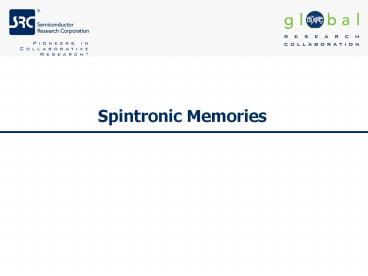Spintronic Memories
1 / 31
Title: Spintronic Memories
1
Spintronic Memories
2
- Magnetic Domain Wall Motion memory
- Magnetic race-track memory
- Stuart Parkin, Magnetic race-track a novel
storage class spintronic memory, Intern J. Mod.
Physics B 22 (2008) 117 - Spin torque transfer MRAM
Should we consider storage-class memories in ERD?
Does is belong to PIDS or to ERD? MRAM has been
transferred from ERD to PIDS in 2003
3
Selection criteria for new technology entries
candidates
4
Minimum Requirement Criteria
- The minimum requirements criteria for a new
technology to be considered as a candidate for
ERD chapter is sufficient research activity, e.g. - the technology is explored by several research
groups, or - There is an extensive research activity of one
group - There are at least 2 publications in
peer-reviewed journals
5
General Loose Criteria
- Potential for scaling
- Roadmap Driver
- On-chip integrated solutions
- Potential for embedded applications
- Outstanding research issues exist
- Guidelines for the research community and
government funding agencies - Not in production
- Innovation phase
6
Spin torque transfer MRAM
7
Conventional MRAM
MRAM element is operated by magnetic field
generated from current lines in the proximity of
MTJ
FM free layer
FM pinned layer
Wireless communication Proximity effects
crosstalk Scaling issue, Heat, reliability etc.
8
MRAM Scaling issue
T. Kawahara et al, 2Mb SPRAM (Spin-Transfer
Torque RAM), IEEE J. Solid-State Circ. 43
(2008) 109 Hitachi group
Scaling issue Conventional MRAM needs a larger
current for smaller dimensions
9
Spin-torque switching
- Injected spin-polarized electrons interact with
the magnetic moment of a free layer and transfer
their angular momentum - If sufficient current is applied, the exerted
spin torque switches the free layer either
parallel or anti-parallel to the pinned layer
depending on the direction of flow of the current - Attractive for memory array applications,
- does not have the magnetic half-select problem
- smaller switching current
- Spin torque transfer RAM (ST-RAM)
- MTJ for spin-torque switching
10
MTJ for spin-torque switching
MTJ is operated by spin polarized current passing
through MTJ
Injection efficiency
Nat
L2
Scaling promise spin-torque MRAM needs a smaller
current for smaller dimensions
11
MRAM and ST-MRAM Scaling
Reciprocal Scaling Relations
12
MRAM and ST-MRAM Scaling
13
Switching time vs. current
14
Outstanding research issues
- Theory
- Critical current issue
- Ic needs to be decreased
- From 107 A/cm2 to 105 A/cm2
- New material structures
- MTJ current needs to be increased
- New MTJ design
- Injection efficiency
Although the presence of spin torque has been
unambiguously observed, its quantitative behavior
in MTJ, especially its bias dependence has yet to
be understood in detail
J. C. Sankey et al., Nature Physics 4 (2008) 67
IBM group
15
New concepts are needed
- Nano-current-channel (NCC) injection
- FeSiO layer with columnar NCC structure
- Current can pass through NCC only
- Provide magnetic nucleation points and induce the
free layer switching through the growth of the
nucleation points
16
General Loose Criteria Discussion Spin torque
transfer MRAM
Does is belong to PIDS or to ERD? MRAM has been
transferred from ERD to PIDS in 2003
- Potential for scaling
- Roadmap Driver
- On-chip integrated solutions
- Potential for embedded applications
- Outstanding research issues exist
- Guidelines for the research community and
government funding agencies - Not in production
- Innovation phase
17
Magnetic Domain Wall Motion memory
18
Magnetic Domain Wall Motion memory
- Current-driven magnetic domain wall (DW) motion
- DWM
- DWM occurs in a submicron-size ferromagnetic
stripe - Charge carriers become polarized by the
interaction between conduction electrons and
local magnetic moments - Exert torque on the magnetic moments within DW
- Sensed by TMR or GMR device
19
20
(No Transcript)
21
Magnetic Race-track Memory
- A proposal for a novel storage-class memory, in
which magnetic domains are used to store
information in a magnetic race-track - Shift register scheme
- A solid state memory with storage capacity
same/better than HDD - Improved performance and reliability
- The magnetic race track is comprised of tall
columns of magnetic material arranged
perpendicularly to the Si surface - The domains are moved up and down by current
pulses - ns pulses
- Sensing by magnetic tunnel junction device
22
(No Transcript)
23
(No Transcript)
24
(No Transcript)
25
DWM at 107 has been demonstrated
26
Domain wall velocity as a function of domain wall
width
Benakli et al., JAP 103 (2008) Seagate Group
27
Planar Configuration
t5 nm
W
L
W, nm N, bit n, bit/cm2 R I V L, cm P, W/cm2 J, A/cm2
100 2.0E05 5.0E09 4.0E06 5.0E-03 20000 1 4.8E06 1.0E09
10 2.0E06 5.0E11 4.0E07 5.0E-04 20000 1 3.3E06 1.0E09
28
W, nm N, bit n, bit/cm2 R I V L, um P, W/cm2 J, A/cm2
100 2.10E01 4.77E09 4.00E02 5.00E-03 2 1 4.76E06 1.00E09
10 2.01E02 4.98E11 4.00E03 5.00E-04 2 1 3.33E06 1.00E09
W, cm N, bit n, bit/cm2 R I V L, um P, W/cm2 J, A/cm2
1.00E-05 2.10E01 4.77E09 4.00E02 5.00E-05 0.02 1 476 1.00E07
1.00E-06 2.01E02 4.98E11 4.00E03 5.00E-06 0.02 1 333 1.00E07
W, cm N, bit n, bit/cm2 R I V L, cm P, W/cm2 J, A/cm2
1.00E-05 2.10E01 4.77E09 4.00E02 5.00E-06 0.00 1.00E-04 5 1.00E06
1.00E-06 2.01E02 4.98E11 4.00E03 5.00E-07 0.00 0.0001 3 1.00E06
29
Main Issue
- Due to the high current densities, strong heating
occurs - DW transformations have been shown to originate
not only from spin torque effects but also from
thermal excitations - For applications, it is a key requirement to
devise ways for efficient cooling
30
There is a considerable interest in DWM
- IBM
- Samsung
- Hitachi
- Seagate
- Canon
31
Outstanding research issues
- The capacity of spin-polarized current to move a
domain wall was experimental established, but - The mechanisms responsible for that motion remain
under debate - Current density needs to be decreased!































